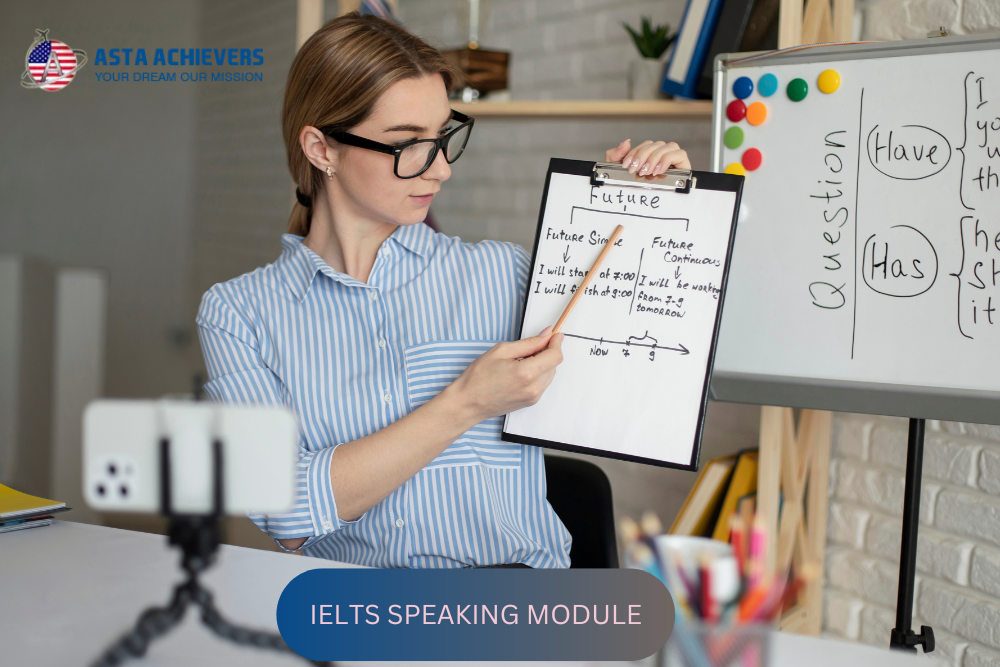Overview
The main criteria of IELTS Speaking test is to evaluate a candidate’s English speaking skills. It is a crucial part of the test, accounting for 25% of the overall score, and is conducted in a face-to-face interview format.
- Structure of the Speaking Module
There are 3 parts in the test to evaluate the candidates’ pronunciation, fluency, grammar and vocabulary.
Why only Asta Achievers
Asta Achievers is the best IELTS Coaching Centre in Gurugram, which prepares the IELTS aspirants with the latest study material and course books which are written and selected by well qualified and experienced trainers.
Asta Achievers
Contact No. -9871882724, 9991406306
Website- www.astaachiever.com
- Part 1: Introductory Session (4-5 minutes)
The candidates will be asked various questions related to their family, friends, education, work, hometown, house, neighbourhood, hobbies, etc. The candidates need to provide detailed answers and not short responses to showcase their fluency and coherence. Create a good first impression. Be confident and give natural sounding answers. Be enthusiastic and show interest throughout the test. Don’t drift away from the topic and avoid giving unnecessary details. Don’t speak too slowly or too loudly.
- Part 2: Cue Card (3-4 minutes)
Candidates get a question card with a particular topic. They have to prepare the topic in a minute and should speak on the given topic for 1-2 minutes. There can be various topics like describing a person, place, event, experience, etc. The candidates should answer this question with a clear beginning, middle and closure, using the preparation time wisely to jot down keywords which will help you develop your answer well. Don’t focus too much on perfect grammar and vocabulary as it may affect your fluency and pronunciation. Don’t memorise answers as it is not necessary that you will get the same topics in the test. It’s better to be natural and spontaneous. Try to give real life examples if possible as they sound more authentic and you can describe them coherently. In some cases, it’s fine to make stories if you have never experienced that situation. When you do speak practice, try to answer who, what, why, where and how while developing the main idea. This will help you to use correct grammar structure. Make proper use of specific adjectives to create interest and curiosity in the examiner’s mind.
- Part 3: Discussion (4-5 minutes)
Part 3 is more abstract. It involves an extensive discussion related to the topic from Part 2. The examiner will ask questions that require students to express their views, explain the topic and give examples to support their opinion. Students should develop critical thinking so that they can answer questions correctly and efficiently. Try to give answers in detail, otherwise the examiner will keep asking you questions. The examiner will get a chance to evaluate your speaking skills deeply in part 3 so answer all the questions in an elaborate way correctly and confidently. Try to attempt all questions even if you don’t have enough idea of the topic. Never say that you don’t know the answer.
Best IELTS Coaching Centre in Gurugram
If you want to achieve 9 Bands in IELTS Speaking Test, Asta Achievers is the right place.
Training Formats: Offers both online and classroom training
- Strategies to get a higher score in Speaking Test:
- Don’t memorise answers because the examiner will not be able to judge your English skills accurately. Try to speak naturally and spontaneously.
- Avoid using unfamiliar words as you may pronounce them wrongly or in the wrong context. Try to use a wide range of vocabulary that you know which is suitable for the topic being discussed. Make a vocabulary list and work upon the meaning and pronunciation of new words.
- Make full use of simple, compound and complex sentences to showcase your grammar skills. Work upon your weaknesses and do speaking practice with your family and friends. Do speaking practice using present, past and future tenses correctly.
- Try to use neutral accent and speak clearly with proper intonation, pronunciation and speed. Be loud, clear and speak without pauses and hesitations.
- Don’t use fillers, such as-like, you know, umm……It shows lack of ideas and leaves a bad impression on the examiner.
- Elaborate your answers and give examples. Make use of adjectives for describing any object or experience. Express your ideas and thoughts using high level vocabulary.
- Take care of your body language. Make an eye contact with the examiner. It will help you to build a rapport with the examiner. Keep a smiling face throughout the test. It will boost your confidence.
- Practice makes perfect. Do a lot of speaking practice and record it. You will be able to find your mistakes related to tenses, vocabulary, pronunciation and intonation so that you can correct them. Apart from that, you can work upon time management.
- Request the examiner to repeat the question which you don’t understand.
- Don’t answer questions in Yes and No, expand your ideas well with explanations and suitable examples.
- If you commit a grammatical mistake while speaking, you can correct it then and there, say sorry and repeat the sentence correctly.
- Listen to native speakers and try to copy their style and intonation.
- Don’t focus too much on sample tests online. They can be misleading. Some of them may not be following the real test format. Don’t try to memorise different topics. Be natural and original.
Special Strategies at Asta Achievers:
- Practicing a range of test-taking strategies
- Focus on Academic Vocabulary
- Working on time management
- Fluency and Pronunciation
Class Size: Small size to ensure individual attention to each student
Asta Achievers
Contact No. – 9871882724, 9991406306
Website- www.astaachiever.com
Email Id- info@astaachiever.com
- Marking Criteria
Your speaking will be judged on these four parts:
- Pronunciation (25%)
Pronunciation is a key part of achieving a high score and it is the most important skill to master in the IELTS Speaking Test. If the examiner is not able to understand what you are actually saying, you will not be able to get a desired score. Work upon your intonation and stress.
- Vocabulary (Lexical Resource) (25%)
You should be able to use suitable words and expressions to showcase your ability to express your ideas well. Use suitable idioms related to the topic and try not to overuse them. Make a vocabulary notebook and write new words, their meaning and pronunciation. Review the new words after one week and make sentences and use them in your daily speaking.
- Fluency (25%)
Fluency is the perfect combination of grammar, vocabulary and confidence. You should speak calmly, confidently and coherently. Fluency doesn’t mean to speak too fast. You need to avoid frequent self-correction, hesitation or repetition. Listen to native speakers on the radio, news and films and try to copy their pace of speech.
- Grammar (25%)
Grammar is the foundation of any language. You should be able to use proper grammar structure in your speaking inn correct Tense form. The examiner wants to check how well you can communicate through spoken English. You don’t need to use too fancy or complex vocabulary. You can use simple English but correctly.
Asta Achievers
Contact No. 9871882724, 9991406306
Website: www.astaachiever.com
Email Id- info@astaachiever.com
Do you have any Doubts?
We are here to assist you


